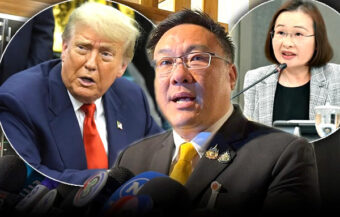Thailand’s economic decline is linked to impractical and ill-conceived policies and implementation. The latest is the BRICS gamble. Despite 1,700 factory closures in 2023, no one is looking at trade policy and the free trade pact between ASEAN, Thailand and China.
The Thai government’s decision this week to join the BRICS group of countries led by Russia and China came as a shock. Certainly, this appears to be a retrograde one for the Thai economy. It comes as questions are being asked about topline government policy formulation. Exactly who is responsible for two decades of economic decline? Undoubtedly, it is government inertia, whether caused by disruption from coup d’états, misjudgments, or political expediency. In short, a failure of actions to match words, or even worse, poor planning or inaccurate planning.

Despite an improvement in the economy in recent weeks, it is clear that it is being driven by the casual sector supported by foreign tourism. In the meantime, Government House talks about transitioning to advanced industry.
Yet only 2% of Thai firms, according to a 2021 report, are generation 4.0 concerns. 89% are still 2.0 and 3.0 industrial operations.
As Prime Minister Srettha Thavisin talks about a ‘green economy,’ exactly what are the nuts and bolts of such an aspiration?
1,700 Thai factories closed down in 2023 as the manufacturing base finds itself redundant because at length, it cannot compete in a new, more open market
In other words, how is this practically going to work while in 2023, 1,700 factories closed in Thailand? At the same time, manufacturing utilisation still hovers at under 60%.
The factories are understood to have closed due to increased competition. One key factor here is Chinese access to the ASEAN market under the Regional Comprehensive Economic Partnership (RCEP).
Was this properly anticipated by the government when it championed the free trade pact? Notably, India pulled out and Prime Minister Narendra Modi was praised for doing so. Therefore, was ASEAN solidarity and friendship with China put ahead of smaller Thai firms?
These are good questions when it is observed that public sector investment fell 45.1% in the seven months to April 30th. In short, there is a glaring lack of coherence and execution in Thai government economic policies.
Some signals of moderate growth within the economy as the Bank of Thailand forecasts a better Quarter Two and signs that things are slowly picking up
Weeks after the Thai government retracted from a bruising battle with the Bank of Thailand, there are signs that the central bank and the Ministry of Finance under Pichai Chunhavajira are getting on better.
At the same time, there are extensive signs of short-term economic recovery.
The central bank this week projected that the economy was set to fare better in Quarter Two. It comes after a 1.5% growth rate was noted in May by the National Economic and Social Development Council (NESDC), ahead of most analysts’ expectations. This was for Quarter One.
In addition, there is encouraging news on manufacturing. After 18 months of decline, it rose in April 2024.
On Sunday, Radklao Inthawong Suwankiri, a spokesperson at the Prime Minister’s Office, said the Manufacturing Production Index (MPI) had risen 3.43% for the month compared to 2023.
The impetus was additional processing of pet food, particularly for dogs, as well as an uptick in air conditioner unit output due to the particularly hot weather.
At the same time, petroleum product output rose, driven by extra demand for a tourist-infused domestic economy.
No signs of a recessionary trend says business chief
The Bank of Thailand’s Sakkapop Panyanukul, the Director of Financial Markets, also touted a rise in inflation.
April was the first month that saw positive inflation following six months of negative price data.
The central bank predicts inflation to be 0.6% for the year and to reach 1% by the end of 2024. The bank’s target range is 1-3%, therefore this matter will be reviewed by the Finance Ministry in due course.
In short, it all points to an economy that is moving forward slowly, driven by foreign tourism and domestic spending.
For instance, Sanan Angubolkul, the chairman of the Thai Chamber of Commerce, insisted this week that there were no recessionary indicators in this economy.
‘Reviewing the economy over the past six quarters, from the fourth quarter of 2022 to the present, it’s evident that while Thailand’s GDP has not grown remarkably, it has been positive, hovering around 2% and far from zero,’ he said. ‘There are no signs of an impending recession.’
The good news on the economy stops there. Thailand presently remains the ‘sick man of Asia’ and it will be difficult to turn the ailing economic ship around
Nonetheless, the good news stops there.
Thailand has over the past two decades consistently lagged behind the growth rates of its Southeast Asian partners. It is now, verily, as an economy, the sick man of Asia.
The problems are varied. If blame is to be apportioned, it must be placed on successive Thai governments including this one.
A key reason for the plunge in export output and manufacturing activity over the last year has been the diminishment of the country’s automotive sector, particularly the car sector associated with the internal combustion engine.
In the last week, Subaru announced that it is ceasing the production of cars in Thailand.
While the Thai government waxes lyrical about EV cars, its previously successful Generation 2.0 and 3.0 auto industry is being decimated.
Significantly, these concerns represented 89% of the country’s manufacturing base in 2021.
Decline and decimation of the country’s flagship auto industry is a glaring example of what is going wrong. The kingdom’s auto sector is now declining
The same is happening in the computer manufacturing sector. Thailand has not attracted foreign investment in previous decades. In effect, it missed out on modern computer chip manufacturing and solid state drives.
The result is the 1,700 factories which closed in Thailand in 2023. Markedly, this was up from 1,100 in 2022. Certainly, this is a serious challenge.
The kingdom was once the top auto manufacturing hub in Southeast Asia. Indeed, it was referred to as the ‘Detroit of Asia.’ Alas, no more.
Car sales in Malaysia now exceed Thailand’s while the kingdom’s market has dropped to third place, also behind Indonesia.
Meanwhile, the Thai government is subsidising imported EV cars from China at a rate of ฿100,000 per car. Of course, the policy is aimed at attracting EV manufacturers to establish in the kingdom but after that, what happens next?
The future success of this industry is not assured. EV car sales fell in Thailand from January 2024 to April 2024. Simultaneously, this trend was also seen in Western countries where EV market share fell.
Undoubtedly, however, it is disrupting the existing ICE car industry. Sales of cars in the opening four months of 2024 were down by 21.5%.
Car production overall was down 2.2% in 2023. This year, the signs are disturbing. Production was down by 23.9% while exports were down by 3.66% in the opening four months
For instance, 64% of cars produced in Thailand are for export.
S curve 4.0 industries moving to Thailand. So far, it is just a pipe dream and talking point for politicians. As of 2021, only 2% of firms met the criteria
The reality is that the government’s pipedreams of advanced S-curve industries linked to the Eastern Economic Corridor (EEC) are just that.
An Industry Department report in 2021 showed that just 2% of industries in Thailand were generation 4.0 concerns.
Simultaneously, 9% were Generation 1.0 factories with little or no machinery. For instance, the fireworks factory in Suphan Buri that exploded in January with 23 lives lost.
Split-second decision saved mother’s life at Suphan Buri fireworks plant which claimed 23 lives mid-week
Lethal Cadmium linked to a shift in dangerous e-waste recycling from China to Thailand since 2017
The manufacturing process in that ill-fated factory was by hand. In other words, people depart for work each day, putting their lives at risk to make a living.
Moreover, the startling developments last month in Rayong and Ayutthaya where a recycling concern was linked to widespread pollution.
Before that, there was a scare concerning cadmium disposal and the proliferation of Chinese-owned recycling firms established in Thailand after 2017.
That was the year when such recycling or waste disposal from foreign countries was banned in China.
Cheaper imports from China are killing off small Thai firms at home in Thailand and the wider Southeast Asian market since the ASEAN free trade pact
In the meantime, Thai business concerns are being decimated by cheaper imports flooding in from China.
Despite a promise by Prime Minister Srettha Thavisin to impose VAT of 7% on imported online purchases up to ฿1,500, the measure, according to Deputy Minister of Finance Julapun Amornvivat, has not yet been implemented.
Indeed, this concession was made by the government of General Prayut Chan-o-cha when it welcomed Chinese giant Alibaba to establish in Thailand at the Eastern Economic Corridor (EEC).
PM wakes up to the threat of cheap Chinese goods dumped on Thailand driven by misguided economic policies
Certainly, at that time, there was talk of special tax facilities and arrangements to allow the behemoth to operate more efficiently and conveniently in Thailand.
Large firms in Thailand dominate the formal economy. 3% of Thai concerns command 80% of the economy. Government is out of touch with small concerns
Small Thai concerns at the time continuously objected but were ignored.
Figures released this week show that 97% of enterprises in Thailand are small or medium-sized industries. However, they only command 10% of market revenue.
In short, 3% of firms in Thailand control 80% of economic activity.
Significantly, it should be noted that 50% of Thailand’s economy is in the dark or ‘off the record’. In short, this may explain poor economic planning and decision-making. Furthermore, it may amplify mistakes when they are made.
Looked at another way, the Thai economy in the last quarter made modest growth. In effect, economic growth is crawling.
The driver of that growth is the casual off-the-book grassroots economy driven by foreign tourism demand.
Drivers in Thailand are turning their backs on the EV hype. Sales in April were down further at 18.4% from March
Meanwhile, Thailand’s government speaks of a transition to a ‘green economy’ and the future being EV cars. However, EV car sales have fallen since January 2024. Indeed, they dropped by 74% in February 2024 and have not recovered.
Meanwhile, the government insists that this is the future for Thai industry when that may not be the case.
United States in a bitter trade war with China, particularly over EV cars. This is the industry essentially that Thailand is importing into the kingdom
Presently, the United States has imposed massive tariffs on Chinese EV vehicles entering its market. In short, Europe is to follow suit. Beijing, in effect, is subsidising this industry.
Despite rhetoric and promises, EV facilities in Thailand do not bring with them the same ancillary support economic activities as old-fashioned ICE vehicles.
Certainly, on this, we will have to wait and see.
Meanwhile, the government announced a slight fall-off in tax collection receipts on Monday.
Pornchai Thiraveja, the Fiscal Policy Office Director-general, revealed collections of ฿1.39 trillion for the opening 7 months to April 30th. It was down by 2.7%.
The Ministry of Finance spent ฿1.769 trillion in the same period.
This has brought a warning from the Bank of Thailand that the government’s planned expenditure of an additional ฿122 billion, including the controversial Digital Wallet stimulus plan, will bring it close to the 70% public debt ceiling under the State Fiscal and Financial Disciplines Act 2018.
Warning from the Bank of Thailand accepted by the Minister of Finance this week. He says he is still comfortable with the kingdom’s level of public debt
It warned that the government may not be able to respond to an emergency if it were to arise.
In response, Minister of Finance Pichai Chunhavajira said he was aware of the situation but that he was comfortable with it.
Nevertheless, the government has fallen short in the seven months to the end of April in public spending. Figures to April 30th show public sector investment down 45.1%.
All of this is concerning investors and analysts.
Quite apart from Thailand’s chronic problems with private sector debt, ageing population and education, there appears to be a growing inertia in the government’s ability to respond effectively. In effect, matching policy practically with the existing economy on the ground.
This includes government policy on things like trade and industrial development.
Disturbing questions that must be confronted over Thailand’s reeling economy are China and EV cars
For instance, questions must be asked about Thailand’s economic relationship with China. Is this benefiting the kingdom? Under the Regional Comprehensive Economic Partnership (RCEP), Thailand is now wide open for business while apparently unprepared for price competition.
Politics and alignment is a key factor in attracting inward investment. Thailand is drifting towards the Russo-Chinese bloc with predictable consequences
Furthermore, the kingdom’s ability to attract inward foreign investment is linked with geopolitical factors. While Thailand insists on pursuing a centuries-old diplomatic policy, it may work politically but not economically.
Thailand recently applied to become a full member of the Organisation for Economic Co-operation and Development (OECD). This is seen as a precursor to a more Western-styled economy with social development linked with economic policy.
However, this week, the Ministry of Foreign Affairs stunned the Western diplomatic community by applying to become a member of the anti-Western BRICS community led by Russia and China.
Minister of Foreign Affairs Maris Sangiampongsa is to fly to Russia next week to attend a BRICS foreign ministers meeting in Nizhny Novgorod.
In the meantime, government spokesman Chai Wacharonke, this week, said a decision on Thailand’s application to join the anti-Western bloc will be made in October.
Stunning decision to apply for BRIC membership
Undoubtedly, politically and diplomatically, it is a decision for the Thai government, but it should be understood that it has significant economic implications. In short, it brings Thailand closer to China and Russia.
Going forward, make no mistake, that is bad news for Western investment in the kingdom.
Unquestionably, without that investment, Thailand’s factory closures will continue. So too will the decline in the technological competitiveness of its manufacturing base.
They say the proof of the pudding is in the eating. Therefore, take one look at foreign investment in Thailand in 2023. It was $2.969 billion.
In contrast, compare it to Indonesia at $21.7 billion, Malaysia at $18.6 billion, and Vietnam at $8.255 billion.
Foreign Direct Investment in the kingdom reversed in the last quarter of 2023 by ฿31.19 billion or $0.84 billion. These figures are from the Bank of Thailand. Indeed, Foreign Direct Investment in Thailand only averaged ฿46.282 billion per quarter from 1986 until 2023 or $1.26 billion. In effect, $5.04 billion a year.
Contradictions in the economic data particularly on foreign investment and foreign tourist spends
The peak period was the first quarter of 2022 when it was ฿214 billion or ฿5.83 billion. The most negative outcome was in the last quarter of 2020 when it again contracted by ฿237.4 billion or $6.47 billion.
Certainly, these figures will appear to contradict Thai government data.
At length, this appears to be based on investment projects approved by the Board of Investment (BOI). For instance, the Royal Thai Embassy in Washington claims ‘applications from local and foreign investors’ amounted to $23.8 billion in 2023. At the same time, $18.6 billion of this was said to be foreign direct investment.
The same contradiction has appeared recently in relation to average foreign tourist expenditures in Thailand. There is a wide difference between the Tourism Authority of Thailand (TAT)’s claims and the central bank’s data.
Join the Thai News forum, follow Thai Examiner on Facebook here
Receive all our stories as they come out on Telegram here
Follow Thai Examiner here
Further reading:
Disturbing questions that must be confronted over Thailand’s reeling economy are China and EV cars
First-quarter GDP growth surprises analysts based on higher tourism and consumer spending growth
Central bank holds interest rates. Economy will grow 2.6% in 2024 as Srettha pushes home ownership
Economy unlikely to grow in first quarter as Thai manufacturing crumbles. Hard choices ahead
New Finance Minister expected in April as economic malaise deepens with downgrades in GDP growth
Digital Wallet plan blown out of the water by corruption body on Tuesday warning of illegality


















